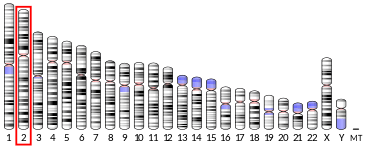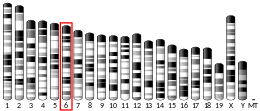NAT8
N-acetyltransferase 8 is a protein that in humans is encoded by the NAT8 gene.[5]
Clinical relevance
Mutations in the NAT8 gene have been associated with chronic kidney disease.[6]
gollark: ```python#!/bin/env python3chars = [chr(n) for n in range(126)]firstchar = chars[0]lastchar = chars[len(chars) - 1]def increment_char(character): return chr(ord(character) + 1)def old_increment_string(string_to_increment): reversed_string = list(reversed(string_to_increment)) # Reverse the string for easier work. for rindex, char in enumerate(reversed_string): if char == lastchar: # If we can't increment this char further, try the next ones. reversed_string[rindex] = firstchar # Set the current char back to the first one. reversed_string[rindex + 1] = increment_char(reversed_string[rindex + 1]) # Increment the next one along. else: # We only want to increment ONE char, unless we need to "carry". reversed_string[rindex] = increment_char(reversed_string[rindex]) break return ''.join(list(reversed(reversed_string)))def increment_string(to_increment): reversed_string = list(to_increment) # Reverse the string for easier work. for rindex, char in enumerate(reversed_string): if char == lastchar: # If we can't increment this char further, try the next ones. reversed_string[rindex] = firstchar # Set the current char back to the first one. reversed_string[rindex + 1] = increment_char(reversed_string[rindex + 1]) # Increment the next one along. else: # We only want to increment ONE char, unless we need to "carry". reversed_string[rindex] = increment_char(reversed_string[rindex]) break return ''.join(list(reversed_string))def string_generator(): length = 0 while 1: length += 1 string = chars[0] * length while True: try: string = increment_string(string) except IndexError: # Incrementing has gone out of the char array, move onto next length break yield string```
gollark: Except it enumerates all possible ASCII strings instead.
gollark: I made that!
gollark: no.
gollark: Check out my cool project!http://localhost:3030
References
- GRCh38: Ensembl release 89: ENSG00000144035 - Ensembl, May 2017
- GRCm38: Ensembl release 89: ENSMUSG00000030004 - Ensembl, May 2017
- "Human PubMed Reference:". National Center for Biotechnology Information, U.S. National Library of Medicine.
- "Mouse PubMed Reference:". National Center for Biotechnology Information, U.S. National Library of Medicine.
- "Entrez Gene: N-acetyltransferase 8 (GCN5-related".
- Suhre K, Shin SY, Petersen AK, Mohney RP, Meredith D, Wägele B, Altmaier E, Deloukas P, Erdmann J, Grundberg E, Hammond CJ, de Angelis MH, Kastenmüller G, Köttgen A, Kronenberg F, Mangino M, Meisinger C, Meitinger T, Mewes HW, Milburn MV, Prehn C, Raffler J, Ried JS, Römisch-Margl W, Samani NJ, Small KS, Wichmann HE, Zhai G, Illig T, Spector TD, Adamski J, Soranzo N, Gieger C (September 2011). "Human metabolic individuality in biomedical and pharmaceutical research". Nature. 477 (7362): 54–60. doi:10.1038/nature10354. PMC 3832838. PMID 21886157.
Further reading
- Ko MH, Puglielli L (2009). "Two endoplasmic reticulum (ER)/ER Golgi intermediate compartment-based lysine acetyltransferases post-translationally regulate BACE1 levels". J. Biol. Chem. 284 (4): 2482–92. doi:10.1074/jbc.M804901200. PMC 2629114. PMID 19011241.
- Ozaki K, Fujiwara T, Nakamura Y, Takahashi E (1998). "Isolation and mapping of a novel human kidney- and liver-specific gene homologous to the bacterial acetyltransferases". J. Hum. Genet. 43 (4): 255–8. doi:10.1007/s100380050084. PMID 9852678.
- Barrios-Rodiles M, Brown KR, Ozdamar B, et al. (2005). "High-throughput mapping of a dynamic signaling network in mammalian cells". Science. 307 (5715): 1621–5. doi:10.1126/science.1105776. PMID 15761153.
- Veiga-da-Cunha M, Tyteca D, Stroobant V, et al. (2010). "Molecular identification of NAT8 as the enzyme that acetylates cysteine S-conjugates to mercapturic acids". J. Biol. Chem. 285 (24): 18888–98. doi:10.1074/jbc.M110.110924. PMC 2881811. PMID 20392701.
- Ariyannur PS, Moffett JR, Manickam P, et al. (2010). "Methamphetamine-induced neuronal protein NAT8L is the NAA biosynthetic enzyme: implications for specialized acetyl coenzyme A metabolism in the CNS". Brain Res. 1335: 1–13. doi:10.1016/j.brainres.2010.04.008. PMID 20385109.
- Popsueva AE, Luchinskaya NN, Ludwig AV, et al. (2001). "Overexpression of camello, a member of a novel protein family, reduces blastomere adhesion and inhibits gastrulation in Xenopus laevis". Dev. Biol. 234 (2): 483–96. doi:10.1006/dbio.2001.0261. PMID 11397015.
- Juhanson P, Kepp K, Org E, et al. (2008). "N-acetyltransferase 8, a positional candidate for blood pressure and renal regulation: resequencing, association and in silico study". BMC Med. Genet. 9: 25. doi:10.1186/1471-2350-9-25. PMC 2330028. PMID 18402670.
- Veréb J, Démant F, Pavkovceková O, Tischler V (1975). "[Agenesis and aplasia of the kidney in children in the x-ray diagnostic picture]". Cesk Pediatr. 30 (3): 94–7. PMID 1139715.
- Köttgen A, Pattaro C, Böger CA, et al. (2010). "New loci associated with kidney function and chronic kidney disease". Nat. Genet. 42 (5): 376–84. doi:10.1038/ng.568. PMC 2997674. PMID 20383146.
- Chambers JC, Zhang W, Lord GM, et al. (2010). "Genetic loci influencing kidney function and chronic kidney disease". Nat. Genet. 42 (5): 373–5. doi:10.1038/ng.566. PMC 3748585. PMID 20383145.
This article is issued from Wikipedia. The text is licensed under Creative Commons - Attribution - Sharealike. Additional terms may apply for the media files.



